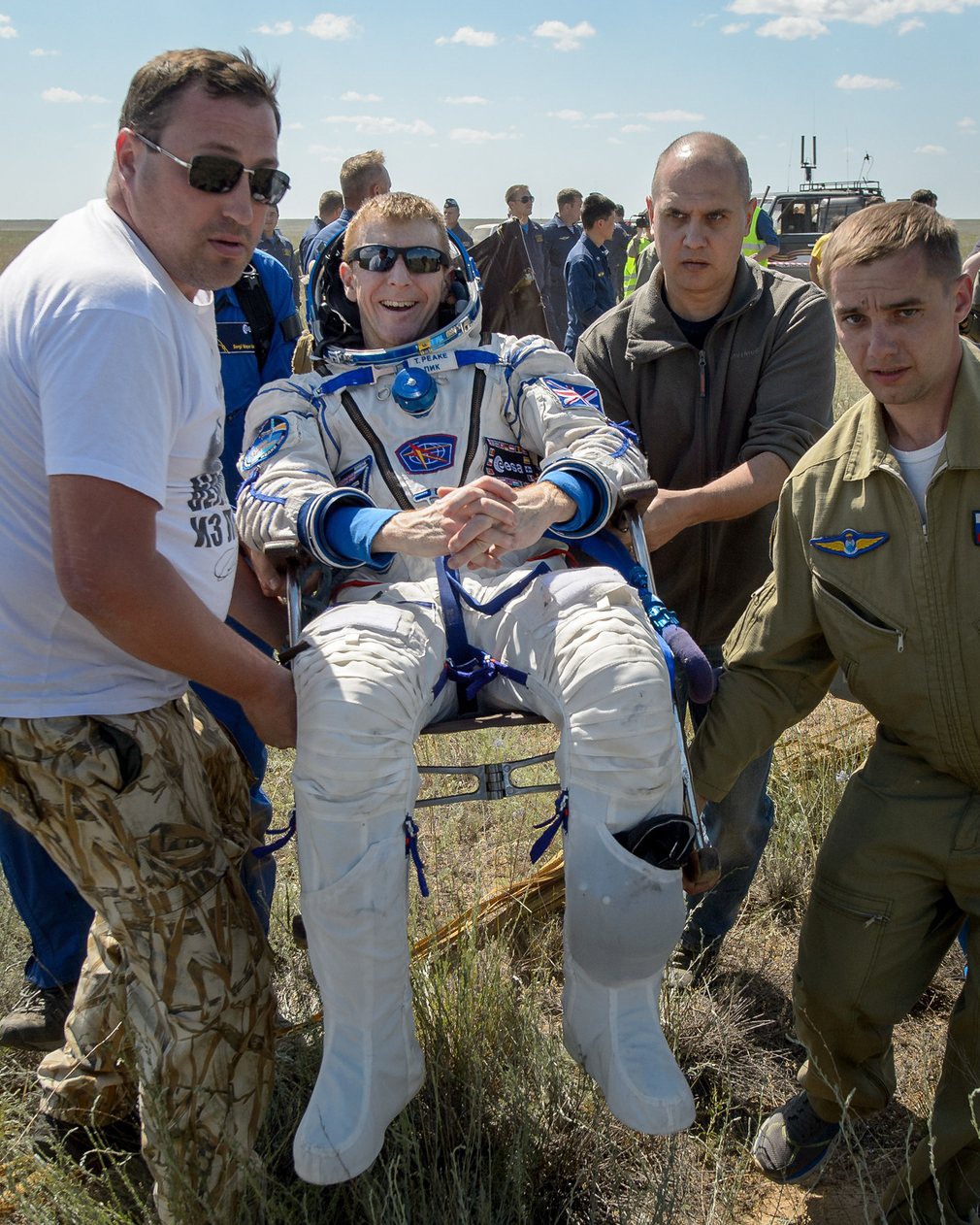
After six months on the International Space Station (ISS)—during which he completed almost 3,000 orbits of Earth, ran a marathon and became the first Brit to do a space walk—Major Tim Peake returned to his home planet on Saturday. The touch down went smoothly, but experts say the astronaut will be experiencing sensations akin to the worst hangover in the universe at the moment, and not just because one of his first post-landing desires was a cold beer.
Peake and two fellow spacemen, Russian cosmonaut Yuri Malenchenko and NASA’s Colonel Tim Kopra, made their final decent back to Earth in a tiny spacecraft called Soyuz, travelling at up to 25 times the speed of sound. The bumpy ride put the men’s bodies through some extreme conditions, which would have left them suffering with Entry Motion Sickness (EMS), with symptoms including sweating, dizziness, nausea, vomiting and headaches.
Despite all this, after being helped from the capsule near Zhezkazgan in Kazakhstan, the charismatic Englishman said he was looking forward to feeling the rain on his face, and to ‘having some pizza… maybe a cold beer as well.’

However, EMS is only phase one of the astronaut’s painful return to the planet, as he readjusts to conditions on terra firma after spending 186 days in microgravity. Peake said his mission, called Principia, had been a ‘life-changing experience’, but it’s inevitably been a body changing experience too, and it typically takes space travellers between six weeks and three years to fully readapt and properly find their Earth legs again.
While in space, communication between astronauts’ brains and their vestibular system, which controls humans’ sense of orientation, motion and equilibrium, gets dulled. Straight after touchdown, however, this system goes into overdrive, causing vertigo and dizziness as the brain desperately attempts to recalibrate what is up and what is down.
‘On Earth, a complex, integrated set of neural circuits allows humans to maintain balance, stabilise vision and understand body orientation in terms of location and direction,’ explains Dr Dorit Donoviel, head of the National Space Biomedical Research Institute.
‘In space, this pattern of information is changed. The inner ear, which is sensitive to gravity, no longer functions as designed. On return to Earth, they must readjust to Earth’s gravity and can experience problems standing up, stabilizing their gaze, walking and turning.’
Major Tim might have trouble explaining how this feels, though, because many astronauts struggle to talk properly when they first land, with their lips and tongue having adjusted to the weightlessness experienced in space.
As well as being tongue tied, Peake will also probably feel as though his limbs are made of lead, as his body fluids attempt to flow from the upper body and head back to the lower body. His heart will have shrunk over the last six months, and he will have less blood in his veins than he did when he took off in December. Back on Earth, in normal gravity, he will effectively have a blood shortage. Because of low blood pressure, he will be prime to fainting, and isn’t allowed to drive for 21 days after landing.
Over 50 per cent of returned astronauts exhibit significant signs of immune dysfunction after long missions, and there is concern that space radiation may affect endothelial cells, which can cause or accelerate coronary heart disease.
Blood aside, Peake will lost up to 10 per cent of his bone mass in the time he has been away, and up to 40 per cent of his muscle mass. He will have shed more skin cells than his body would have created, leading to soft and sensitive hands and feet, and he may well need glasses, at least temporarily, after pressure on the optic nerve caused by microgravity. Some astronauts have experienced permanent blurred vision after their return.
All these sensations will be new to Peake, returning from his first space flight, but his travel companion Malenchenko might have passed on a few tips, having now spent a total of 828 days away from our planet during six space journeys (a cumulative total second only to fellow cosmonaut Gennady Padalka, who has spent 879 days in space).
The good news is that the man who spent the longest time in space in one hit, Valery Polyakov, who kicked his heels for 437 days and 18 hours days on the old and increasingly wobbly Russian space station Mir in 1994–95, apparently suffered no long term problems upon his return, and is now well into his 70s.
One thing Major Tim will need immediately, however, is a new wardrobe, because he will have grown during his sojourn in space, without gravity compressing his vertebrae. NASA astronaut Scott Kelly grew two inches taller than his Earth-bound twin brother during his year-long stint on the ISS.
Scientists will study Peake very closely while his body readjusts, using the information gathered to help plan longer missions into space, such as the mooted manned mission to Mars, which NASA is aiming to undertake before 2030.
